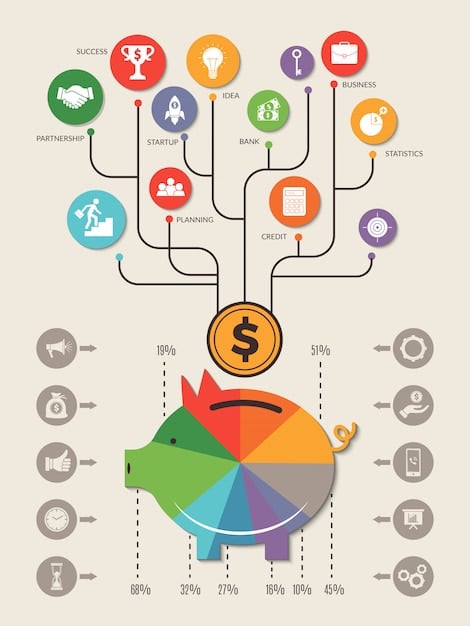Decoding SEC Crypto Guidelines: A US Investor’s Guide

Decoding the Latest SEC Guidelines on Cryptocurrency Exchanges: A US Investor’s Guide provides essential insights for US investors navigating the evolving landscape of cryptocurrency regulations, ensuring compliance and informed decision-making.
Navigating the world of cryptocurrency can feel like traversing a minefield, especially with the ever-changing regulatory landscape. For US investors, understanding the latest **Decoding the Latest SEC Guidelines on Cryptocurrency Exchanges: A US Investor’s Guide** is crucial for making informed decisions and staying compliant.
Understanding the SEC’s Role in Cryptocurrency Regulation
The Securities and Exchange Commission (SEC) plays a vital role in overseeing financial markets in the United States. As cryptocurrencies have gained popularity, the SEC has increasingly focused on regulating exchanges and other entities involved with digital assets.
This section explores the SEC’s mandate and how it applies to the cryptocurrency space.
What is the SEC’s Mandate?
The SEC’s primary mission is to protect investors, maintain fair, orderly, and efficient markets, and facilitate capital formation. This includes overseeing securities offerings, exchanges, and broker-dealers.
Why is the SEC Regulating Cryptocurrency?
The SEC’s interest in cryptocurrency stems from its view that many digital assets are, in fact, securities. If a cryptocurrency is deemed a security, it falls under the SEC’s regulatory purview, requiring registration and compliance with securities laws. This is to shield investors from fraud and scams and ensure market transparency.

- Protecting Investors: The SEC aims to protect investors from fraudulent schemes and ensure they have access to accurate information before investing in digital assets.
- Maintaining Market Integrity: By regulating cryptocurrency exchanges, the SEC hopes to prevent market manipulation and ensure fair trading practices.
- Facilitating Innovation: While the SEC is focused on regulation, it also acknowledges the need to foster innovation in the digital asset space.
Ultimately, the SEC’s involvement in cryptocurrency regulation is an effort to bring digital assets into the fold of traditional financial oversight, providing a level of protection and stability for investors.
Key Changes in the Latest SEC Guidelines
To stay compliant, it’s important to keep track of the latest SEC guidelines. The SEC regularly updates its stance on cryptocurrency regulations. Changes can impact how exchanges operate and how investors engage with digital assets.
Let’s delve into the most recent updates from the SEC related to cryptocurrency exchanges.
Defining “Security” in the Context of Cryptocurrency
A significant part of the SEC’s framework hinges on whether a cryptocurrency is classified as a security. The SEC uses the Howey Test, derived from a Supreme Court case, to determine if an asset qualifies as a security. The Howey Test states that an investment contract exists when there is an investment of money in a common enterprise with a reasonable expectation of profits to be derived from the efforts of others.
Registration Requirements for Cryptocurrency Exchanges
Exchanges that list or trade digital assets considered securities must register with the SEC as national securities exchanges or operate under an exemption. Registration necessitates compliance with a host of requirements, including those related to record-keeping, reporting, and anti-money laundering (AML) programs.

- Expanded Definition of “Exchange”: The SEC has broadened the definition of what constitutes an “exchange” to capture a wider range of digital asset platforms.
- Stricter Compliance Measures: The updated guidelines emphasize the need for exchanges to implement robust compliance programs to prevent fraud and manipulation.
- Increased Enforcement Actions: The SEC has ramped up its enforcement actions against cryptocurrency exchanges that fail to comply with securities laws.
The latest guidelines reflect the SEC’s commitment to adapting its regulatory framework to the unique challenges and opportunities presented by the cryptocurrency market. Awareness of these modifications is key for everyone. The SEC’s effort to bring cryptocurrency within conventional financial oversight provides some level of protection for investors.
Impact on Cryptocurrency Exchanges in the US
The evolving regulatory environment significantly impacts US-based cryptocurrency exchanges. Understanding these implications is critical for both exchanges and investors.
This section explores the ways in which the current SEC guidelines are reshaping the cryptocurrency exchange landscape in the United States.
Increased Compliance Costs
Complying with SEC regulations can be expensive for cryptocurrency exchanges. Exchanges must invest in building robust compliance programs, hiring legal experts, and implementing advanced surveillance technologies to detect and prevent fraud. These costs can be particularly burdensome for smaller exchanges with limited resources.
Delisting of Certain Cryptocurrencies
In response to SEC scrutiny, some cryptocurrency exchanges have chosen to delist certain digital assets that are deemed securities. This can limit the investment options available to US investors and impact the liquidity of those assets.
Consolidation in the Exchange Market
The increased compliance burden and regulatory uncertainty may lead to consolidation in the cryptocurrency exchange market. Smaller exchanges may struggle to compete with larger, well-funded exchanges that have the resources to navigate the complex regulatory landscape.
The impact on cryptocurrency exchanges is not solely negative. By adhering to SEC guidelines, exchanges enhance credibility. This encourages wider acceptance. The industry matures. Navigating SEC regulations in the US will require adaptability.
What US Investors Need to Know: A Practical Guide
For US investors, navigating the SEC guidelines related to cryptocurrency exchanges can seem daunting. Understanding your rights and responsibilities can enhance the experience.
Here’s a practical guide to help you stay informed and make sound investment decisions in the cryptocurrency space.
Do Your Research
Before investing in any cryptocurrency, conduct thorough research to understand its underlying technology, business model, and regulatory status. Be wary of projects that promise unrealistic returns or lack transparency.
Understand the Risks
Cryptocurrencies are inherently volatile and speculative investments. Be prepared to lose money and never invest more than you can afford to lose. Consider your own risk tolerance and investment objectives before allocating capital to digital assets.
Use Registered Exchanges
Opt for cryptocurrency exchanges that are registered with the SEC or operate under an exemption. Registered exchanges are subject to greater regulatory oversight and must comply with certain investor protection measures. Doing so can reduce the risk of fraud and manipulation.
Stay Informed
Keep abreast of the latest SEC guidelines and enforcement actions related to cryptocurrency. Follow reputable news sources and industry experts to stay informed about regulatory developments that may impact your investments.
Overall, navigating the cryptocurrency market involves awareness and education. US investors who take the time to understand the risks and regulations can make more informed choices.
Future of Cryptocurrency Exchanges Under SEC Regulation
The future of cryptocurrency exchanges in the US is inextricably linked to the SEC’s regulatory approach. As the digital asset space evolves, so too will the SEC’s framework for overseeing it.
This section speculates on what lies ahead for cryptocurrency exchanges under SEC regulation.
Increased Clarity and Certainty
Over time, the SEC is expected to provide greater clarity and certainty regarding its regulatory expectations for cryptocurrency exchanges. This could include issuing more detailed guidance on when a digital asset qualifies as a security and what steps exchanges must take to comply with securities laws.
Greater Institutional Adoption
As the regulatory landscape becomes clearer, it could pave the way for greater institutional adoption of cryptocurrency. Institutional investors, such as hedge funds and pension funds, may be more willing to allocate capital to digital assets if they have confidence in the regulatory framework.
Technological Innovation
SEC regulation will likely spur further technological innovation in the cryptocurrency space. Exchanges and other entities may develop new technologies to enhance compliance, security, and transparency.
- Continued Evolution: The SEC’s stance on cryptocurrency is not static; it will continue to evolve as the digital asset space matures.
- Global Coordination: The SEC may collaborate with other regulatory agencies around the world to develop a more harmonized approach to cryptocurrency regulation.
- Focus on Decentralized Finance (DeFi): As DeFi protocols become more prevalent, the SEC is likely to turn its attention to regulating this emerging area of the cryptocurrency market.
The future of cryptocurrency exchanges under SEC oversight points toward increased oversight. As the SEC continues to refine its approach, the industry is likely for the better for US investors.
Resources for Staying Compliant with SEC Regulations
Staying up-to-date with the latest SEC guidelines can be challenging. Here are some resources to help you navigate the regulatory landscape and ensure compliance.
This section compiles key resources that US investors can use to inform themselves and make smart investment decisions:
SEC Website
The SEC’s website (www.sec.gov) is a comprehensive source of information on securities laws, regulations, and enforcement actions. You can find guidance on cryptocurrency-related topics, as well as educational materials for investors.
SEC Investor Education Center
The SEC’s Investor Education Center offers a variety of resources to help investors make informed decisions. This includes investor alerts, bulletins, and guides on various investment topics, including cryptocurrency.
Industry Associations
Several industry associations, such as the Blockchain Association and the Chamber of Digital Commerce, provide resources and advocacy on cryptocurrency-related issues. These associations often host events and publish reports on regulatory developments.
Consulting with legal and compliance professionals is also imperative. For exchanges and businesses, professional guidance is helpful. The goal is to stay abreast. Seek counsel. It’s about protecting investments.
| Key Point | Brief Description |
|---|---|
| 🔑 SEC’s Role | Overseeing crypto exchanges to protect investors and maintain market integrity. |
| 📝 Howey Test | Used to determine if a cryptocurrency is a security and thus subject to SEC regulations. |
| ⚖️ Compliance | Exchanges must register with the SEC, implement AML programs, and meet reporting requirements. |
| 🛡️ Investor Tips | Research assets, understand risks, choose registered exchanges, and stay informed. |
Frequently Asked Questions
▼
The Howey Test determines if an asset is a security based on the investment of money in a common enterprise with the expectation of profits primarily from others’ efforts. For crypto, it assesses whether a digital asset is offered as an investment contract.
▼
Unregulated crypto exchanges pose risks like potential fraud, market manipulation, and lack of transparency. Investors may have limited recourse if they lose funds due to the exchange’s mismanagement or fraudulent activities.
▼
US investors can check the SEC’s website to see if a cryptocurrency exchange is registered as a national securities exchange or has obtained an exemption. Registered exchanges are subject to regulatory oversight.
▼
Exchanges must implement AML programs, including customer identification, transaction monitoring, and reporting suspicious activities to regulatory authorities. These measures are crucial for preventing illicit uses of cryptocurrency.
▼
Investors can utilize the SEC’s website, investor education center, and industry associations to stay informed about SEC guidelines. Consulting legal professionals can also ensure they’re updated on the current regulations.
Conclusion
Understanding the SEC’s latest guidelines on cryptocurrency exchanges is crucial for US investors navigating the digital asset market. By staying informed, conducting thorough research, and utilizing available resources, investors can make sound decisions and protect their investments in this evolving landscape.





